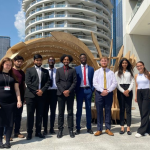Disability – my story
Written by Carolyn Simmonds, Head of Programme – London Works/Employment
I was registered disabled in 2017, due to an eye condition called glaucoma. I knew 13 years earlier that it was highly likely I would lose my sight completely – having been diagnosed with glaucoma, albeit much less severe. Having worn glasses from the age of 7, I’ve always been short sighted and would often, post-2017, acknowledge people without really recognising them.
In 2020, it was clear that my eyesight was deteriorating and in 2021 I lost my vision entirely. But the world didn’t stand still, and life went on and still does. My work life and my personal life adjusted around me quickly and I somehow slipped into my new world seamlessly…. So I’m told. My work colleagues quickly learned to announce their names and mandatory disability training ensued. My social circles soon became adept to guiding me around, in fact, I was led and pulled about enthusiastically! Often people talk louder (as if I can’t hear). But generally speaking, my disability has demonstrated how friendly and humane the world can be. It’s not without its challenges; I won’t say I don’t ever feel excluded because I do. However, there is a big difference to feeling alone and lonely, and I never feel lonely. Examples of this are when my environment isn’t brought to life for me – and that could be simple things such as explaining who is the butt of the joke in the moment, when people laugh around me and I’m not sure why; describing what someone is wearing (I’m a bit of a fashionista, or so I like to think); or reading out what is said in a Zoom chat as it is inaccessible to me.
I feel disadvantaged from a tech perspective, so find it hard to access things like banking apps; often asking to touch the very keypad I cannot see several times to access services. The majority of organisations that you call direct you to their website for their online service or support and could be more user friendly with better voice recognition functionality. I am also still looking for a patient personal shopper as my favourite store ASOS doesn’t (as yet) describe vocally what their items look like. I am fiercely independent and the hardest thing for me is asking for help, but in my disability I am becoming more understanding that I can no longer do everything like before, so my frustration is dwindling by the day, as the support around me grows. I’m an avid traveller and special assistance at airports is very useful and dignified, and who doesn’t want to clear customs quickly? And get the odd upgrade? Equally – regarding travelling on public transport – initially the thought, not just for me but for my family, was scary, but again once I experienced the humility of the people that service the VIPs (as we are called at train and tube stations) it installed confidence and any anxieties slipped away quickly. I still go to the theatre, I still go out dancing, in fact there is very little that I don’t do that I did before, apart from walking alone, and I never did much walking anyway.
There’s still a lot of work to be done and I am still transitioning. 21% of working aged adults in the UK are disabled, but when I ask about the disabled population amongst my client groups it is an unknown entity. I know that back in the day everyone who claimed they were an equal opportunities employer shortlisted disabled applicants as a matter of course, but I do wonder how many were actually recruited and progressed. There was also a time when lift attendant jobs were ring fenced for disabled people, I wonder what the generic role for a disabled person Is now? I am definitely committed to working on improving employment amongst disabled people and want to work with employers who actively promote equality and equity in the workplace and will recognise talent; improving their valuable assets as opposed to seeing disability as negative trait.
My personal experience, of continuing my career as part of a vibrant leadership team, I’m proud to say, has been of adjustments made to maintain not just my productivity at work but my positive wellbeing and sense of inclusion. This has made me feel equal amongst my team members. I am yet to figure out the meaning of when people say, “you don’t look blind”, and am grateful for the support of my white cane, which I have aptly called ‘Raza’ which, translated in Yoruba, means ‘hope’. I’m a year in on this unknown and sometimes scary journey, but one thing I know, I will continue to embrace it positively and continue to enjoy life, as those who know me well, know that my moto is: “live, don’t exist”.
Tips to raise awareness and be more inclusive around blind people:
- Say what you see, speak the visuals, and bring us into your colourful world
- Try putting a tie around your eyes in the comfort of your home, where it is familiar, and you will get a snippet of what a visually impaired person has to navigate and embrace every minute of every day.
- Have ‘dinner in the dark’ or visit that famous place in the city. I did, and raised £360 for RMIB back in 2018 when I could still see.
- Don’t speak in the third; blind people can hear.
- Speaking for myself, I am more than happy to talk about my blindness, so please feel free to ask politely, let’s not try to avoid the elephant in the room. Plus, it’s good therapy.
One thing that I miss:
- Physical freedom – walking up to people independently, be it at work, in a supermarket, on a dance floor, or in a networking situation, this definitely makes me feel alienated. Honestly, I’m not ignoring you, I just can’t see you. Also, think about smiling, one of the most natural things in the world, but unfortunately, I can no longer see when someone is smiling at me, in order to return it to them.
To stay up to date with the latest news, opportunities and success stories, please sign up to receive our monthly newsletter, here.


